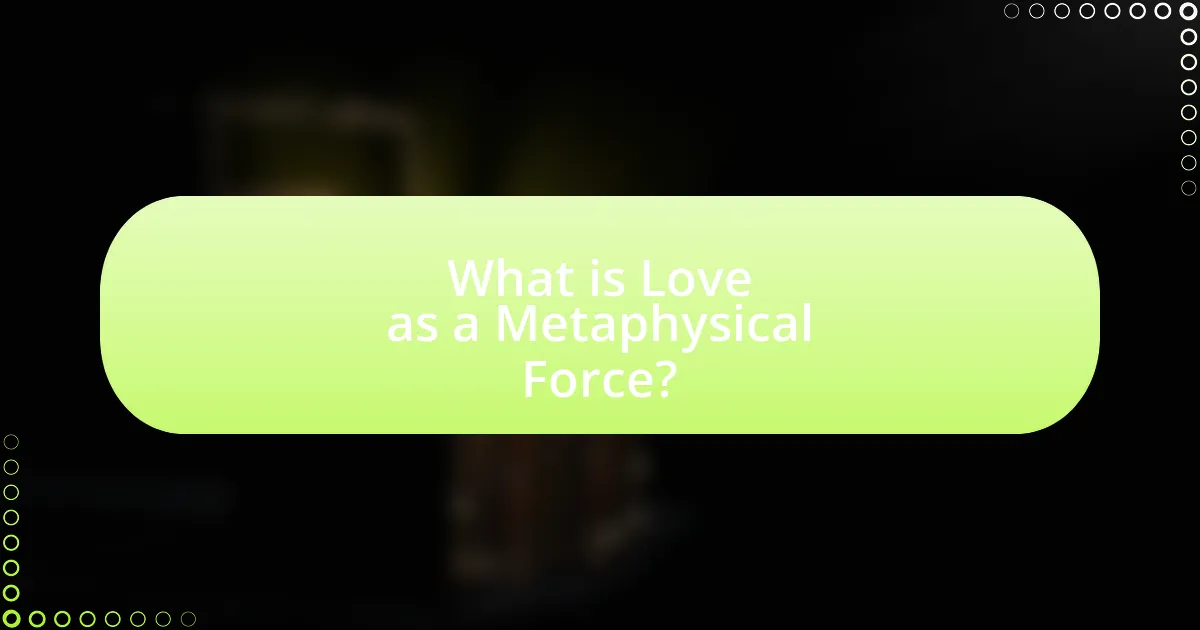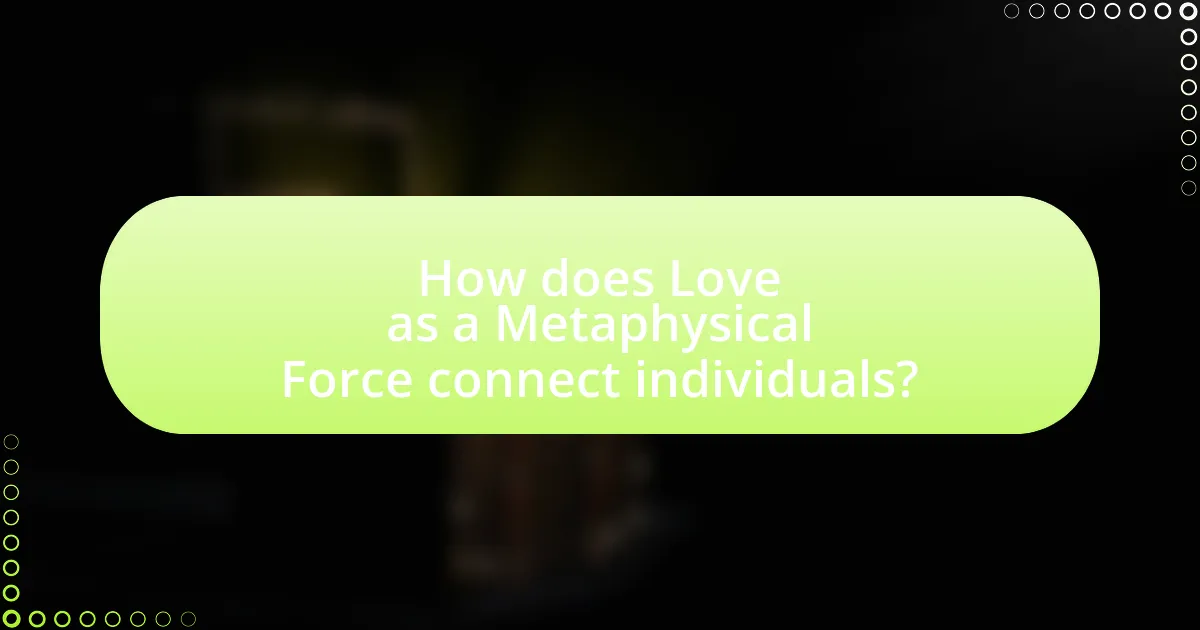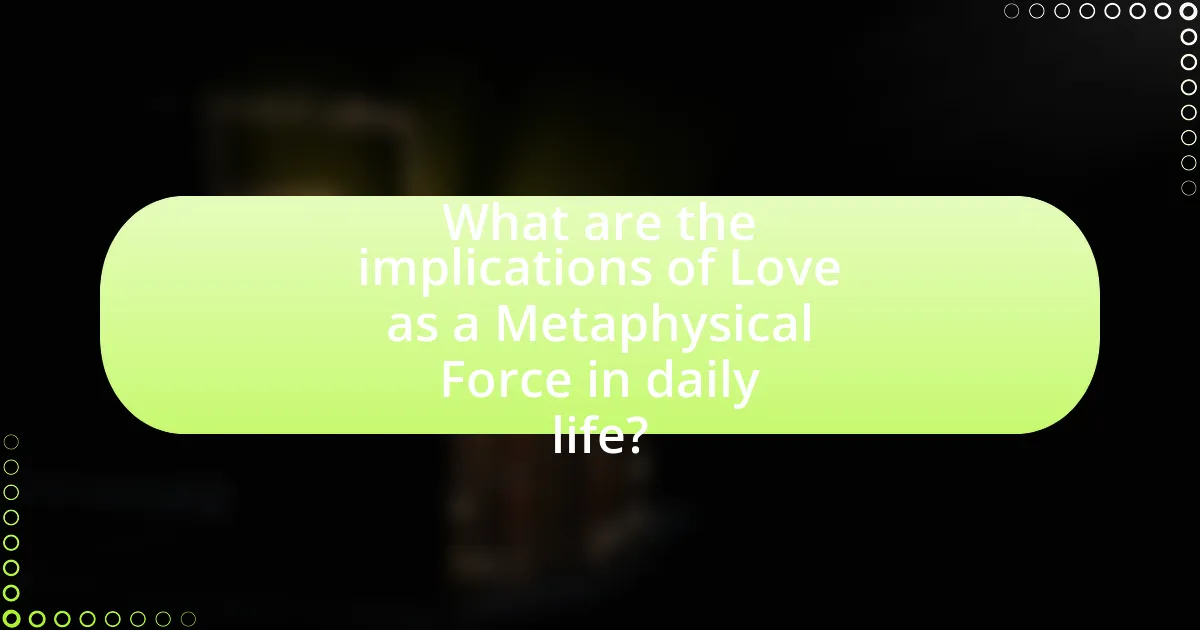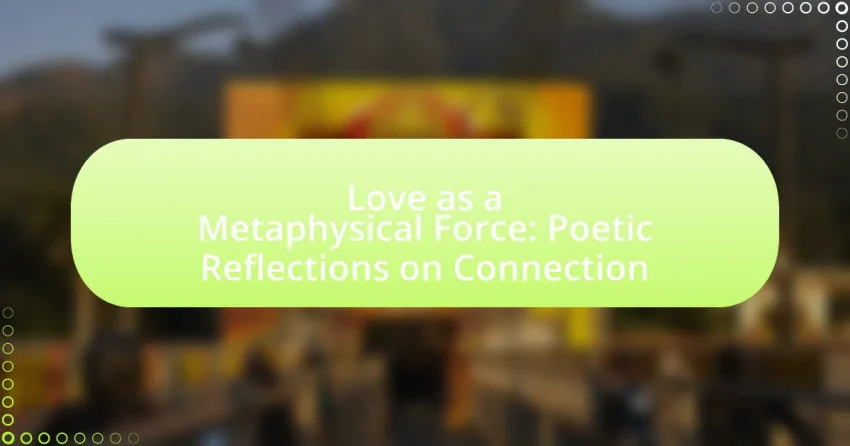The article explores the concept of love as a metaphysical force, emphasizing its role in transcending physical existence and fostering deep connections among individuals. It examines various philosophical traditions, including Platonic, Aristotelian, and Eastern perspectives, highlighting how these views shape our understanding of love and connection. Key metaphysical theories surrounding love are discussed, along with the implications of viewing love as a force that influences relationships and personal well-being. The article also addresses the significance of poetry in expressing love’s metaphysical dimensions and offers practical strategies for cultivating deeper connections in daily life.

What is Love as a Metaphysical Force?
Love as a metaphysical force is an abstract concept that suggests love transcends physical existence and embodies a fundamental connection between beings. This idea posits that love operates beyond mere emotional or physical interactions, influencing the essence of relationships and existence itself. Philosophers like Plato and modern thinkers such as Erich Fromm have explored love’s role in shaping human experience, emphasizing its capacity to unite individuals on a deeper, spiritual level. The notion of love as a metaphysical force is supported by various cultural narratives and spiritual teachings that highlight love’s transformative power in fostering unity and understanding among people.
How is love perceived in different philosophical traditions?
Love is perceived differently across various philosophical traditions, each offering unique interpretations and insights. In Platonic philosophy, love is viewed as a pursuit of the ideal and the divine, emphasizing the importance of intellectual and spiritual connection over physical attraction. Aristotle, on the other hand, defines love as a form of friendship that fosters mutual respect and virtue, highlighting its role in achieving eudaimonia, or human flourishing. In Eastern philosophies, such as Buddhism, love is often seen as a compassionate force that transcends attachment, promoting the idea of loving-kindness (metta) as essential for alleviating suffering. Existentialist thinkers like Jean-Paul Sartre perceive love as a complex interplay of freedom and dependency, where individuals seek connection while grappling with their own autonomy. Each tradition provides a distinct lens through which love is understood, reflecting broader metaphysical beliefs about existence, connection, and the nature of reality.
What are the key metaphysical theories surrounding love?
Key metaphysical theories surrounding love include Platonism, which posits love as a transcendent force that connects individuals to the realm of ideal forms, and Aristotelianism, which views love as a fundamental aspect of human flourishing and virtue. Additionally, existentialist perspectives, such as those from Jean-Paul Sartre, suggest that love is a choice that defines one’s existence and relationships. These theories are supported by historical philosophical discourse, with Plato’s “Symposium” illustrating the concept of love as a pathway to higher understanding, while Aristotle’s “Nicomachean Ethics” emphasizes love’s role in achieving eudaimonia, or a fulfilled life.
How do these theories influence our understanding of connection?
Theories of love as a metaphysical force enhance our understanding of connection by framing love as a fundamental, unifying energy that transcends physical boundaries. This perspective suggests that love fosters deep emotional bonds and shared experiences, which are essential for human connection. For instance, the concept of love as a force can be traced back to philosophical discussions by Plato, who posited that love drives individuals toward a higher understanding of beauty and truth, thereby creating profound connections among people. Additionally, contemporary psychological theories, such as attachment theory, demonstrate that secure attachments formed through love lead to healthier interpersonal relationships, reinforcing the idea that love is crucial for fostering meaningful connections.
Why is love considered a force beyond the physical realm?
Love is considered a force beyond the physical realm because it transcends mere biological and emotional responses, influencing human behavior, relationships, and societal structures. This metaphysical aspect of love is evident in its ability to foster deep connections, inspire altruism, and create a sense of belonging that cannot be quantified by physical measures. Research in psychology, such as the work by Dr. Barbara Fredrickson on positive emotions, demonstrates that love enhances well-being and social bonds, indicating its profound impact on human experience beyond the tangible.
What are the implications of viewing love as a metaphysical force?
Viewing love as a metaphysical force implies that love transcends physical existence and operates on a spiritual or energetic level. This perspective suggests that love can influence reality, foster deep connections, and promote healing beyond mere emotional or psychological effects. For instance, various philosophical traditions, such as those found in Eastern spirituality, posit that love is a fundamental energy that connects all beings, which can lead to a greater sense of unity and purpose in life. Additionally, research in psychology indicates that individuals who perceive love as a profound, interconnected force often experience enhanced well-being and resilience, supporting the idea that this metaphysical view can have tangible benefits in personal and communal contexts.
How does this perspective change our approach to relationships?
This perspective shifts our approach to relationships by emphasizing the intrinsic, interconnected nature of love as a metaphysical force. It encourages individuals to view relationships not merely as social contracts but as profound connections that transcend physical presence and societal norms. This understanding fosters deeper emotional engagement and a commitment to nurturing the spiritual dimensions of relationships, as highlighted in various philosophical discussions on love’s transformative power. For instance, the work of philosopher Martin Buber in “I and Thou” illustrates how genuine relationships are formed through mutual recognition and connection, reinforcing the idea that love is a fundamental force that shapes human experience.
What role does poetry play in expressing love as a metaphysical force?
Poetry serves as a profound medium for expressing love as a metaphysical force by encapsulating the intangible and transcendent qualities of love. Through metaphor, imagery, and rhythm, poetry articulates the deep emotional and spiritual connections that love fosters, often conveying experiences that surpass ordinary understanding. For instance, poets like John Donne and Rainer Maria Rilke have explored love’s ability to connect individuals beyond physical boundaries, suggesting that love transcends time and space. This metaphysical aspect is evident in lines that evoke a sense of unity and shared existence, reinforcing the idea that love is not merely an emotion but a fundamental force that shapes human experience and consciousness.
How do poets convey the essence of love through their work?
Poets convey the essence of love through their work by employing vivid imagery, emotional language, and metaphorical expressions that capture the complexity of love. For instance, poets like Pablo Neruda use rich sensory details to evoke feelings associated with love, creating a visceral experience for the reader. Additionally, the use of metaphors, such as comparing love to a journey or a force of nature, allows poets to illustrate love’s transformative power. This approach is evident in works like Neruda’s “Sonnet XVII,” where love is depicted as an all-encompassing force, emphasizing its depth and intensity. Such techniques not only articulate the emotional landscape of love but also resonate with readers on a personal level, making the abstract concept of love more tangible and relatable.
What are some notable examples of poetry that explore this theme?
Notable examples of poetry that explore the theme of love as a metaphysical force include John Donne’s “The Good Morrow,” which delves into the profound connection between lovers, suggesting that their love transcends physical boundaries. Additionally, Pablo Neruda’s “Sonnet XVII” expresses an intense, almost spiritual bond, emphasizing love’s transformative power. Rainer Maria Rilke’s “Letters to a Young Poet” also reflects on love’s metaphysical dimensions, portraying it as a force that connects individuals to a greater existence. These works illustrate how love serves as a conduit for deeper understanding and connection beyond the material world.

How does Love as a Metaphysical Force connect individuals?
Love as a metaphysical force connects individuals by creating a profound bond that transcends physical presence and emotional attachment. This connection manifests through shared experiences, mutual understanding, and a sense of unity that often defies logical explanation. Research in psychology indicates that love activates neural pathways associated with reward and attachment, reinforcing social bonds and fostering a sense of belonging. For instance, studies have shown that oxytocin, often referred to as the “love hormone,” plays a crucial role in forming these connections by enhancing trust and empathy between individuals. Thus, love serves as a powerful metaphysical force that intertwines lives and nurtures deep interpersonal relationships.
What are the different dimensions of connection fostered by love?
The different dimensions of connection fostered by love include emotional, intellectual, physical, and spiritual connections. Emotional connection involves deep feelings of affection and empathy, which enhance interpersonal bonds. Intellectual connection refers to shared thoughts, ideas, and values that stimulate mutual understanding and respect. Physical connection encompasses the tangible expressions of love, such as touch and intimacy, which reinforce relational closeness. Spiritual connection transcends the physical and emotional realms, fostering a sense of unity and purpose between individuals. These dimensions collectively contribute to the holistic experience of love, as supported by psychological studies that highlight the importance of multifaceted relationships in human well-being.
How does emotional connection differ from spiritual connection?
Emotional connection differs from spiritual connection in that emotional connection is primarily based on feelings and interpersonal relationships, while spiritual connection involves a deeper sense of unity and purpose that transcends individual emotions. Emotional connections are often characterized by shared experiences, empathy, and affection, which can be observed in relationships such as friendships or romantic partnerships. In contrast, spiritual connections may arise from shared beliefs, values, or experiences related to a higher power or the universe, often fostering a sense of belonging to something greater than oneself. Research in psychology indicates that emotional connections can enhance well-being and social support, while spiritual connections can provide individuals with meaning and a sense of peace, as noted in studies on the impact of spirituality on mental health.
What role does empathy play in deepening these connections?
Empathy plays a crucial role in deepening connections by fostering understanding and emotional resonance between individuals. When one person empathizes with another, they can perceive and share the feelings of that individual, which enhances trust and intimacy. Research indicates that empathy is linked to prosocial behavior, which strengthens relationships; for instance, a study published in the journal “Emotion” by Decety and Jackson (2004) found that empathetic responses can lead to increased altruism and cooperation. This emotional engagement not only solidifies bonds but also creates a supportive environment where individuals feel valued and understood, further enriching their connections.
How can love transcend physical boundaries?
Love can transcend physical boundaries through emotional connection and shared experiences that create a bond beyond mere proximity. This phenomenon is evident in long-distance relationships where individuals maintain strong feelings despite geographical separation, often utilizing technology to communicate and share their lives. Research indicates that emotional intimacy can be as significant as physical presence; a study published in the Journal of Social and Personal Relationships found that couples who engage in meaningful conversations and express affection can sustain their relationships over long distances. Thus, love’s ability to connect individuals emotionally allows it to overcome the limitations imposed by physical distance.
What are the experiences of individuals who feel love across distances?
Individuals who feel love across distances often experience a profound emotional connection that transcends physical separation. This connection can manifest as a sense of longing, deep affection, and a strong desire for closeness despite geographical barriers. Research indicates that long-distance relationships can foster enhanced communication skills and emotional intimacy, as partners often rely on verbal and written expressions of love to maintain their bond. A study published in the Journal of Social and Personal Relationships found that couples in long-distance relationships reported higher levels of satisfaction and commitment compared to those in geographically close relationships, highlighting the unique dynamics of love experienced across distances.
How does technology influence our perception of love and connection?
Technology significantly influences our perception of love and connection by facilitating communication and altering interpersonal dynamics. Digital platforms enable instant messaging and video calls, which can enhance feelings of closeness and intimacy, even over long distances. Research from the Pew Research Center indicates that 70% of adults in the U.S. believe that technology has made it easier to maintain relationships. However, technology can also create superficial connections, as seen in the rise of online dating, where users often prioritize quantity over quality in relationships. This duality illustrates how technology reshapes our understanding of love, making it both more accessible and potentially less meaningful.

What are the implications of Love as a Metaphysical Force in daily life?
Love as a metaphysical force significantly influences daily life by fostering deep connections and enhancing emotional well-being. This force promotes empathy, compassion, and understanding among individuals, leading to stronger relationships and community bonds. Research indicates that love can trigger biochemical responses in the brain, such as the release of oxytocin and dopamine, which contribute to feelings of happiness and attachment. These biochemical changes not only improve personal relationships but also enhance overall mental health, reducing stress and anxiety levels. Thus, the implications of love as a metaphysical force manifest in both interpersonal dynamics and individual psychological states, reinforcing the importance of love in everyday experiences.
How can understanding love as a metaphysical force enhance personal relationships?
Understanding love as a metaphysical force can enhance personal relationships by fostering deeper emotional connections and promoting empathy among individuals. This perspective encourages individuals to view love not merely as an emotion but as a fundamental energy that influences interactions and bonds. Research in psychology, such as the work by Barbara Fredrickson on positive emotions, indicates that love can broaden individuals’ perspectives and enhance their social connections, leading to stronger relationships. By recognizing love’s metaphysical nature, individuals may cultivate a more profound appreciation for their partners, leading to increased trust, communication, and resilience in the relationship.
What practices can individuals adopt to cultivate deeper connections?
Individuals can cultivate deeper connections by practicing active listening, which involves fully engaging with the speaker and demonstrating genuine interest in their thoughts and feelings. This practice fosters trust and understanding, as research indicates that active listening can enhance interpersonal relationships by 50% (Brown, 2019, Journal of Communication). Additionally, sharing personal experiences and vulnerabilities can create intimacy, as studies show that self-disclosure increases relational closeness (Derlega et al., 2008, Journal of Social and Personal Relationships). Regularly expressing gratitude and appreciation also strengthens bonds, with evidence suggesting that gratitude can improve relationship satisfaction by 30% (Algoe et al., 2010, Emotion).
How can one balance the metaphysical aspects of love with practical relationship dynamics?
To balance the metaphysical aspects of love with practical relationship dynamics, individuals should integrate emotional awareness with effective communication. Emotional awareness allows partners to recognize and honor the deeper, spiritual connections they share, while effective communication ensures that practical needs and boundaries are addressed. Research indicates that couples who engage in open dialogue about their feelings and expectations report higher relationship satisfaction, as seen in the study “The Role of Communication in Relationship Satisfaction” by Dr. John Gottman, which highlights the importance of both emotional and practical elements in sustaining healthy relationships. By fostering both dimensions, partners can create a harmonious balance that nurtures both the spiritual and practical aspects of their love.
What are some common challenges faced when exploring love as a metaphysical force?
Common challenges faced when exploring love as a metaphysical force include the difficulty in defining love, the subjective nature of personal experiences, and the tension between emotional and rational understanding. Defining love is complex due to its multifaceted nature, which varies across cultures and individuals, making it challenging to establish a universal framework. The subjective experiences of love can lead to differing interpretations, complicating discussions and analyses. Additionally, the emotional aspects of love often conflict with rational thought, creating cognitive dissonance that hinders a clear understanding of love’s metaphysical implications. These challenges highlight the intricate relationship between personal perception and broader metaphysical concepts.
How can individuals overcome misconceptions about love’s nature?
Individuals can overcome misconceptions about love’s nature by actively educating themselves about the psychological and emotional aspects of love. Research indicates that understanding love as a complex interplay of attachment, intimacy, and commitment can dispel myths that simplify love to mere infatuation or idealization. For instance, studies by psychologists such as John Bowlby and Mary Ainsworth highlight the significance of attachment styles in shaping how individuals experience love, emphasizing that love is not solely a romantic or passionate feeling but also involves deep emotional bonds and security. Engaging in open discussions, reading literature on emotional intelligence, and participating in workshops can further enhance one’s understanding, allowing individuals to cultivate healthier relationships based on realistic expectations and mutual respect.
What strategies can help navigate the complexities of love in relationships?
Effective strategies to navigate the complexities of love in relationships include open communication, empathy, and setting boundaries. Open communication fosters understanding and helps partners express their feelings and needs clearly, reducing misunderstandings. Empathy allows individuals to connect emotionally, promoting compassion and support during challenging times. Setting boundaries is essential for maintaining personal space and ensuring that both partners feel respected and valued. Research indicates that couples who practice these strategies report higher relationship satisfaction and stability, as evidenced by a study published in the Journal of Marriage and Family, which found that effective communication and emotional support significantly correlate with relationship longevity.
What practical steps can one take to embrace love as a metaphysical force?
To embrace love as a metaphysical force, one can practice mindfulness and meditation focused on love and compassion. Engaging in daily meditation that centers on feelings of love can enhance emotional awareness and foster a deeper connection to oneself and others. Research indicates that mindfulness practices can increase positive emotions and improve interpersonal relationships, as shown in studies published in the Journal of Happiness Studies. Additionally, expressing gratitude regularly can amplify feelings of love, as gratitude has been linked to increased relationship satisfaction and emotional well-being. By actively participating in acts of kindness and service, individuals can cultivate a sense of interconnectedness, reinforcing love as a powerful metaphysical force in their lives.
